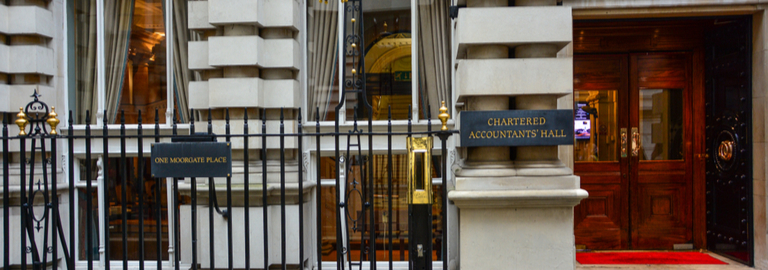
It has been a long wait for the Brydon Report, which has been greatly anticipated by those in the accountancy and audit industry. However, its eventual release on the 18 December, a week before Christmas and so soon after a general election, came as somewhat of a surprise.
The 138-page report authored by Sir Donald Brydon comes after a year of work that saw him receive 120 submissions, speak with a number of stakeholders and consult both an Advisory Board and an Auditor’s Advisory Group.
The result? 64 recommendations, made by Brydon, including the formation of a separate audit industry with its own governing principles.
As the industry digests the report and waits to learn whether the recommendations will be implemented by the new Conservative government, we have collected the responses from key voices in the industry, starting with a short response from Business Secretary Andrea Leadsom, who confirmed that the government would be working to reform audit early next year.
Andrea Leadsom:
“The quality and reliability of audit has come under the spotlight on too many occasions, and it’s essential that we rebuild trust and confidence in this vital business oversight. Sir Donald’s review, as well as work carried out by Sir John Kingman and the CMA, will help inform our reform of audit early next year. I thank them for their work.”

Professional bodies
Professional bodies in the industry acknowledged that the recommendations would represent big changes for the profession. For those that offer qualifications, Brydon’s recommendation that auditors are also trained more in forensic accounting to aid the detection of fraud will likely impact qualifications.
The Chartered Institute of Internal Auditors, the professional body that specifically represents auditors, has called on the Government to take ‘swift action’ on audit reform following the publication of Brydon’s report.
In particular, it highlighted its support for the proposals that “strengthen the requirements on company directors in relation to the risk, internal control and governance framework.” The report itself highlighted the Chartered IIA’s development of an Internal Audit Code of Practice, due to be published in January 2020.
The ICAEW called the establishment of the FRC’s replacement – Audit Reporting and Governance Authority (ARGA) – critical. The ACCA welcomed Brydon’s redefinition of audit that reflects the public interest.
Specifically concerned with management accountants, The Chartered Institute of Management Accountants (CIMA) said they were pleased with the recommendation that businesses should be mandated to provide their board an Internal Controls Statement agreed by the CEO and CFO.
Dr Ian Peters, Chief Executive, Chartered IIA
“Following a series of corporate collapses linked to audit and governance deficiencies, including Carillion, radical reform of the audit and corporate governance framework is long overdue. The government must now get on and act swiftly on the recommendations made by Sir Donald Brydon.
Resources & Whitepapers
“We believe the Brydon recommendations strengthening the requirements on company directors in relation to governance, risk and internal controls should help to raise corporate governance standards. Strong, effective and well-resourced internal audit functions have a central role to play in supporting boards to step up to the plate and meet these enhanced responsibilities.
“Now Brydon has reported, we would also like to see the government accelerate reform of the audit regulator, speeding up the legislation required to establish and put the new Audit, Reporting and Governance Authority on a statutory footing, with the powers and authority it needs to do its job properly.”
Michael Izza, CEO, ICAEW
“Sir Donald’s thorough report contains some bold proposals which could change the way the accountancy profession operates within the UK business landscape. We agree that audit urgently needs to keep pace with the needs, not just of investors, but of wider stakeholders in society, and we are long-standing advocates of proportionate and practical change to restore public trust.
“We are pleased Sir Donald recognises the role played by all the directors of a company, and the need for the whole board to be accountable. We will consider the recommendations in detail and continue to work with all parties to deliver a coherent programme of reform.
“This report makes the early establishment of ARGA even more critical, and we urge the government to bring forward the necessary legislation at the first opportunity.”

Maggie McGhee, executive director of governance, ACCA
“Throughout Sir Donald’s timely review, ACCA has clarified the primary beneficiary of audit should remain the investor and that change is needed in the audit sector for it to evolve sufficiently.
“It is welcomed that Sir Donald has proposed a redefinition of audit to reflect the public interest. ACCA’s own research identifies a clear expectation gap between what the public expects from auditors and what the profession can deliver. The public has high expectations of the auditor’s responsibility in terms of fraud detection.
“We are pleased Sir Donald recognises that the successful reform of audit is also dependent on the implementation of reforms concerning the roles of directors and audit committees.
“ACCA will be considering the detailed and far reaching recommendations made by Sir Donald.
“We also welcome the proposed Independent Implementation Review in 2025, it demonstrates a long-term commitment to the progression of three key reviews and to successful reform of the audit sector. ACCA will continue to work with each of the ongoing audit reviews and will be commenting in due course.”
Andrew Harding, Chief Executive of Management Accounting, The Chartered Institute of Management Accountants (CIMA)
“The Chartered Institute of Management Accountants (CIMA) welcomes the release of Sir Donald Brydon’s Report and congratulates the committee on its deliberations.
“We believe that the move towards a UK SOX regime and mandating businesses to provide their Board an Internal Controls Statement agreed by the CEO and CFO is a positive recommendation. This would help businesses take a more integrated approach to reporting and give them a further push to ensure their governance is robust and their Boards have the information they need to protect the business model, strategy and values of their organisation.
“Strong corporate governance is how businesses will thrive in these unpredictable times and Boards need as much reliable information to support the long-term sustainability of their business as possible.”

Big Four ‘welcome’ the report
Much of the criticism around audit has been aimed at the “oligopoly” the Big Four firms – Deloitte, PwC, EY and KPMG – have over the audit market in the UK. Between them, the Big Four audits 97% of the FTSE 350 audit market, but have been a subject of a number of investigations into the quality of their audits following a series of high-profile company collapses, and prompting Brydon’s review.
Deloitte’s managing partner of audit and assurance, Stephen Griggs, welcomed the recommendation from Brydon to clarify the role of the auditor, something that has been questioned recently – particularly about whether auditors are responsible for uncovering fraud. Brydon says they are.
PwC, EY and KPMG all ‘welcomed’ the report, each highlighting the work they are doing to improve audit, or to reaffirm their commitment to aiding the process of audit reform.
Stephen Griggs, deputy CEO and managing partner for audit and assurance and public policy, Deloitte
“Sir Donald Brydon’s report sets out a bold vision of a future corporate reporting system and the very purpose of audit – with much needed clarity over the roles of auditors, directors, investors and regulators and the part they can each play.
“There are challenges to audit firms and the wider profession around how we can go further in terms of transparency, independence and communication. A future audit product and market can be built around these.
“A consensus around what an audit does, and doesn’t, do and whose purpose it serves has been long overdue. These recommendations would settle that debate and go a long way to repairing trust in business, strengthening the audit profession and improving the overall quality of UK financial and corporate reporting.
“Sir Donald’s report, along with recommendations from Sir John Kingman and the CMA, should be considered as one holistic package of reforms. We look forward to engaging as this progresses.”
PwC, EY and KPMG all ‘welcomed’ the report, each highlighting the work they are doing to improve audit, or to reaffirm their commitment to aiding the process of audit reform.

PWC Statement
“We welcome Sir Donald Brydon’s comprehensive review and vision for the future of audit and will study the recommendations in detail. As a firm we are committed to playing our part in introducing changes which improve audit quality, help rebuild confidence in audit and the corporate reporting system and ensure that the UK remains a leader in audit.
“We are working hard to enhance the quality of our own audits. At the same time we recognise that audit needs to evolve to ensure that corporate reporting meets the needs and expectations of stakeholders in a fast changing and complex world.”
Hywel Ball, UK head of audit, EY
“We welcome Sir Donald Brydon’s report and are pleased to see a focus on the public interest, stakeholder reporting and director accountability. We believe the review will play an important role in ensuring the audit profession is able to continue to serve the evolving needs of business, investors and the public interest.
“We continue to believe that the right set of comprehensive changes is needed to enhance protection for UK pensioners, employees and investors. We remain committed to playing an active and constructive role in the development of the proposals and all the interconnected reviews into corporate reporting and audit.”
Bill Michael, UK Chairman and Senior Partner, KPMG
“We welcome this comprehensive report from Sir Donald Brydon and the recognition of the important role that audit plays in society. We will now study the report in detail and over the coming months we look forward to working with the Government, the FRC and other key stakeholders on how the recommendations of this report can best be taken forward.
“As a firm we have made a number of changes, which demonstrate how serious we are about rebuilding trust in our profession and the excellence and independence of our audit practice. We were the first firm to announce the discontinuance of non-audit services to FTSE 350 companies we audit, to introduce graduated findings in our audit reports and to change our governance to create a separate audit executive committee, which is solely focused on the performance management of our audit business.
“This is an important moment for audit: we recognise that the expectations of audit – and of corporate reporting – have evolved over the years. Sir Donald’s review is an important milestone in setting out how audit might better meet stakeholder needs both now and in the future.”
Mid-tier firms – Grant Thornton, Mazars, Crowe…
The firms that occupy the market space below the Big Four perhaps have more of a stake in audit reform. Some, like French firm Mazars in particular, have been strong advocates for a system that employs joint audit – when large companies would be required to hire a ‘smaller’ firm in addition to a Big Four firm (should they opt for one) when employing an auditor. This would mean more work for mid-tier firms like Mazars, and arguably improves audit accountability.
Brydon specifically references joint audit in his report. He writes: “Perhaps the most controversial recommendation is that from the CMA regarding joint audits. I did not seek evidence in relation to this concept amongst either users or producers of audit. Nonetheless I have received many negative comments from both. It is not clear to me that joint audits would improve the quality of audit in anything but the long term and, even then, with no certainty. However, I recognise that there may be competition imperatives which are viewed as more important and accordingly I have deliberately chosen not to opine on the merits or otherwise of such proposals.”

Mazars, or other mid-tier firms that have responded to the report, have thus far not referenced his comments on joint audit. Grant Thornton and Mazars did, however, join the Big Four in welcoming the report.
Grant Thornton acknowledged that the perception of audit in the UK is weak, and that the time was right to explore changes. Mazars called on the new government to act, highlighting that there are now three “clear, credible and authoritative reports” that set out the framework for the future of audit.
Crowe, and in particular Steve Gale, the firm’s head of audit, highlighted the report’s focus on FTSE 350 companies, but also welcomed the report. Nigel Bostock, Crowe’s Chief Executive, said that now was the time for a shake-up of the audit market to restore the public’s faith and trust in it.
Jonathan Riley, head of quality and reputation, Grant Thornton UK LLP
“We welcome the consideration given by Sir Donald in today’s report on the quality and effectiveness of audit. These recommendations should bring far greater clarity and transparency to the profession and ultimately result in an audit regime that allows auditors to better assess, assure and inform all users of financial accounts. Whilst these changes won’t occur overnight, company directors and audit firms will have much to think about over the holidays.
“Crucially, the Government must now consider these recommendations not just in context of earlier inquiries into the profession, but also against the backdrop of global trade and Britain’s future role as a pillar of global commerce. The report places new obligations not only on auditors, but also on company directors. We need to ensure these, taken with other regulations such as the revised Ethical Standard and wider corporate governance requirements, strike the right balance and do not dent our place on the world’s financial stage. Careful explanation particularly of what this means to those fast growing mid-sized public entities seeking capital will be necessary.
“The public perception of audit remains weak and failures continue to happen, so we agree that now is the right time to explore what needs to change to ensure that audit is fit for modern day business and meets the public interest. Today’s report should contribute heavily towards this outcome.”
Phil Verity, Senior Partner, Mazars
“We welcome the publication of the Brydon report, which successfully strikes the balance between radical thinking and practical solutions. It outlines a framework for bringing auditing into the 21st century, ensuring the profession is valuable and relevant to stakeholders in a modern economy.
“In particular, we are pleased that our belief that auditors play a critical role in society is reflected in today’s report. We believe that a corporate auditing profession applying Principles of Corporate Auditing will help to attract and retain the best talent, while driving up professional standards.
“In addition, we strongly support the proposed extension of audit beyond the financial statements to encompass ESG, cyber, controls and culture. Applying clear and consistent measurement of these factors will have a profound impact on businesses and society, and auditors are ideally placed to lead this shift.
“The new government now has in its possession three clear, credible and authoritative reports, which together form a framework for the future of audit. The CMA’s proposals strengthen resilience and competition in the audit market, Sir John Kingman’s review of the FRC addresses regulatory oversight, and now Lord Brydon’s report sets the tone and aspirations for the future of the industry. The roadmap is complete, and it is now incumbent upon BEIS to grasp the opportunity for profound and lasting reform.”
Nigel Bostock, Chief Executive, Crowe:
“Nobody is under any illusion that the audit market in the UK is in need of a shake-up to ensure the public can have faith that the principles of trust, transparency and independence are entrenched in the work being carried out by audit professionals. We therefore welcome not only the forward-thinking nature of the provisions outlined in the Brydon Review but agree with its underlying impetus, motivation and rationale.
“The rigour and quality of audit work must be held to the highest possible standard. The audit process is too integral to the proper functioning of society and the economy for anything less to suffice.”
Steve Gale, Head of Audit, Crowe:
“While the focus of the Brydon Review has been on the quality of audit provision for FTSE 350 companies, some of the recommendations – including, clearly, the creation of a new audit profession distinct from accounting – will undoubtedly impact the market as a whole.
“The radical nature of some of the changes that are proposed in this review, as well as the CMA review and Kingman Review that preceded it, should be welcomed for their attempts to make changes that makes audit fit for the future. It is critical this time, unlike with some of the past reviews, that we have action, not just words.”
Steve Gale, Head of Audit at Crowe (quoted above) joins Brian Palmer, Tax policy expert at AAT and James Poyser, CEO of inniAccounts, to discuss the issue of trust in audit in an Accountancy Age panel debate.
Outside the bubble
It is easy to focus on what accountancy firms are saying about the report, but the recommendations would have and similarly significant impact on the wider business community if implemented. In their response to the report, Business performance firm Ayming spoke out against the “near-total” dominance that has been enjoyed by the Big Four, welcoming the recommendations made by Brydon.
Hermes Investment Management highlighted the recommendation from Brydon that there should be more accountability around companies and their ability to pay dividends.
Mark Smith, Partner for Innovation Incentives, Ayming
“The changes suggested by Sir Donald present a huge opportunity for other specialist consultancies who can provide a more focused expertise in specific sectors or areas of a business. This move will encourage competition and will be beneficial for the accounting and consulting industry as a whole. A change of the established order is afoot, and much needed.”
“The Big Four have had a near-total dominance of consulting and auditing services, with the vast majority of the FTSE 250 still serviced by these companies in one capacity or another. It’s true that the Big Four are seen as a safe option because they will provide a decent service for the full suite of consultancy services that major listed companies would need.
“However, after a string of investigations and scandals and calls from industry bodies such as the CMA to break up this oligopoly, a perfect storm means the dominance of these are being challenged. There’s a serious image problem.”

Leon Kamhi, Head of Responsibility, Hermes Investment Management
We wholeheartedly welcome the findings of the Brydon review. If properly implemented, the measures suggested should help restore confidence in the auditing profession, following the failure of some to properly hold company directors to account contributed to a number of high-profile corporate collapses.
A key finding is the need for accounts to provide decision-useful information to all users, which accurately reflect the true underlying performance of a business.
We also support the greater rigour and accountability in the ability of a company to pay dividends. We would expect that distributable reserves are calculated based on realised or near-realised profits.
The Public Interest Statement and the consideration of external signals could be a game-changer in ensuring that the needs of all stakeholders are reflected in the accounts of an audited company and that the company is measured on the sustainable wealth it is creating. We would urge a proper treatment of liabilities arising from climate change to ensure that companies, not the taxpayer, picks up the looming climate bill.
It is positive that accountability for the metrics used in auditor remuneration is being encouraged. We also believe that auditor firms need to step up their governance with increased independence and transparency to the public.
To increase audit quality, a review of the skills being deployed in audit firms should occur and we would encourage more specific knowledge of the business and industry to be deployed.
The review represents an opportunity for investors to step up and engage more on the accounting and audit issues that are so critical to the performance of their investments.
If you feel that you or someone you represent should be included in this collection of responses to the Brydon report, please send your comments to a member of the Accountancy Age editorial team.
You can find the full Brydon report here.
Leave a Reply